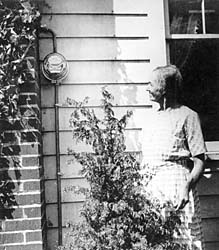National Broadband Plan: Rural Electrification all over again

On Tuesday, the FCC will roll out its National Broadband Plan to provide high speed Internet to the American masses that don't have it and to speed it up for those who do. It's high time we have something like this.

To solicit feedback, FCC chairman Julius Genachowski has been running a so-called Citizen Tube page where he was taking questions in text and video about broadband to influence the plan. It's closed to questions now given the plan is only 24 hours away, but I found the "Access and Affordability" section most interesting. Others include Mobile and Wireless, Security and Privacy, Digital Economy, Internet in Schools and Other.
You can get a feel for Genachowski's priorities from a release he put out in February and the video below (warning: it's an hour and nineteen minutes...you better have a gigabit per second). They are very Obama-esque. You know: fix everything right now. I love it.
Affordability and Access (2,007 votes on 52 questions from 580 people) hits home more than all the other issues combined. The questions at Citizen Tube complain about several things: cost and how providers continually jack up the price; poor rural access and how that contributes to dwindling populations; and why other countries like Korea and Denmark are so much further ahead on higher speeds when the Internet, after all, was invented here.
"Why is Internet so much faster in other countries than in the U.S.? What is the FCC doing to bring access speeds up to par" asks Dan from California.
"What about our most rural towns? We have no broadband or mobile phone access. Our businesses and children are leaving," comments Evslin in Vermont.
Read the questions for yourself and maybe you can identify with the same concerns. It must be awful to feel like a third world country when you're living in the U.S. Imagine if YOU didn't have access to the cloud or reading these pearls of wisdom.
I've been lucky to have broadband since 1995, but until last November there was only one game in town which after a half dozen mergers and acquisitions ended being Comcast. Indeed, my small town of 4,000 was one of the first in the nation to get broadband.
As soon as Verizon FIOS came to my town, I booted Comcast. While FIOS is a somewhat better service, I will be paying roughly the same as I was for Comcast when most of the promotions to lure me in run out after 3-6 months. Between mobile and FIOS, I shell out north of $300 a month to Verizon, now. While that's a lot, it's also a reflection of new priorities.
These large providers claim they have to recoup and profit from the billions it cost to build out the massive network infrastructure to supply millions of customers with Internet and mobile phone access. I suppose they do under the strictures of a free economy.
That was also true in 1935 when the FDR created the Rural Electrification Administration. While 90 per cent of urban dwellers enjoyed modern electricity, 90 per cent of the rural population endured life without it. That's unimaginable now. Just ask all the people in the Northeast who's power was knocked out by this past weekend's storm.
"Private utility companies, who supplied electric power to most of the nation's consumers, argued that it was too expensive to string electric lines to isolated rural farmsteads. Anyway, they said, most farmers, were too poor to be able to afford electricity. The Roosevelt Administration believed that if private enterprise could not supply electric power to the people, then it was the duty of the government to do so," according to a history of the Tennessee Valley Authority.
Enter the Government's "duty" to execute a Nation Broadband Plan. It's not that radical given that developed countries already have broadband plans of their own, knowing full well, fast and available access to the Internet is one of the keys to a high standard of living.
Follow me on Twitter.
This post was originally published on Smartplanet.com